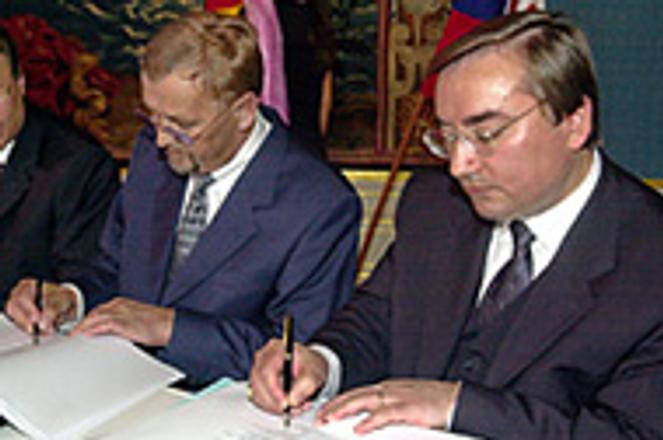Transport and Telecom Minister Jozef Macejko (right) signs the deal on the sale of state telecoms firm ST to Deutsche Telekom, thus bringing to a successful close Slovakia's first large privatisation tender.photo: TASR
The government began 2000 trying to put a difficult year for telecoms behind it. Summer 1999 had seen not just the controversial scrapping of a tender for a third mobile phone operator, but also the subsequent resignation of Telecoms Minister Gabriel Palacka.
The biggest and most important privatisation in the coalition's term so far, that of telecoms firm Slovenské telekomunikacie (ST), was to be the litmus test for the biggest state sell-offs ahead. The entire process was slated for completion in 1999 but had been dogged throughout that year by a number of delays, and the first half of 2000 saw little change.
Despite the appointment of a privatisation advisory team the previous year, headed by Deutsche Bank, the sale stalled on the passing of a new telecoms law, a must for the privatisation to go ahead. In March, ministers asked for more time to review the proposed laws, pushing the date for parliamentary approval of the law back to April. Then on April 14 mobile phone operator Globtel objected to parts of the new law, stating it would put existing operators in the market at a disadvantage and that it was not fully compliant with standards set down by the European Union (EU).
While the Telecoms Ministry rebuffed the claims and eventually pushed the law through, more weeks were lost. Then a new problem cropped up - shares held by ST in Poštová banka.
The state forced ST to take part in a capital hike at the bank on May 23 using ST's 25% share in the finance house. However, the move led to the resignation of ST general director Emil Hubinák on May 25, who said that the decision would lead to a waste of ST's hard-earned cash.
It was only four days later that one of the three final bidders for the stake, Telekom Austria, pulled out. The firm said it had too much going on its domestic stock market to bid for ST. It denied that it was concerned about the Poštová banka capital hike.
At that point Deutsche Telekom and Dutch firm KPN were left to slug it out for the 51% stake. But on the day when the two were to submit their bids, June 30, KPN pulled out, claiming it had been concerned that it would not be able to exercise full management control at a privatised ST, and that formulas for setting the price of telecom services had not been defined to their satisfaction.
"They didn't offer enough freedom for us," one KPN official said after the announcement.
Deutsche bid one billion euros for the stake - a sum the government would have been more than pleased with when the tender began.
However, the two late pull outs and the seemingly interminable delays in finishing the sale left a slightly bitter aftertaste in the mouth of some. Analysts welcomed the eventual outcome and praised the government for pulling off its first large-scale privatisation with a positive result.
But after the sale, it emerged that the bidders had sometimes learnt of key developments within ST, such as the Poštová banka saga, through the media rather than from the government, and while both Telekom Austria and KPN denied that the Poštová affair had anything to do with their pull-outs, the sometimes poor lines of communication in the tender, many analysts said, must have played on both bidders' minds.
Despite the problems, the government hailed the privatisation as a success. Analysts said there were some lessons to be learned, but the main aim had been achieved - a successful sale to a well-respected company at a good price.
Author: Compiled by Ed Holt


